Answers (1)
Know the Answer?
Not Sure About the Answer?
Find an answer to your question 👍 “What environmental factors in the Renaissance caused a shift in subject matter? ...” in 📗 Arts if the answers seem to be not correct or there’s no answer. Try a smart search to find answers to similar questions.
Search for Other Answers
You Might be Interested in
In contrast to folk culture popular culture is typical of
Answers (1)
Bebop is a style of a. pop. b. ragtime. c. jazz. d. fusion.
Answers (1)
Jennifer is working in a hot kitchen and doesn't want to become dehydrated. she grabs a liquid measuring cup, fills it with water and ice, and brings it back to her work station to drink while she is working. what about this practice is incorrect?
Answers (2)
So can someone answer this? It's for my fashion assignment. General skirt outlines Question 1: A skirt with a semi-flared outline A: Circle Skirt B: A-line Skirt C: Pencil Skirt D: Petticoat skirt Question 2 A skirt with multiple layers - normally
Answers (2)
Who is Benjamin Hernandez?
Answers (2)
New Questions in Arts
What are the elements that touch the zigzag line classify as?
No Answers
What tools are used for relief paintings
Answers (2)
Michelangelo Buonarroti's, Last Judgement. What is/was the source of inspiration for this famous painting? What does the painting depict?
Answers (1)
Define the musical term motet
Answers (2)
What are the main shapes in a painting
Answers (1)

